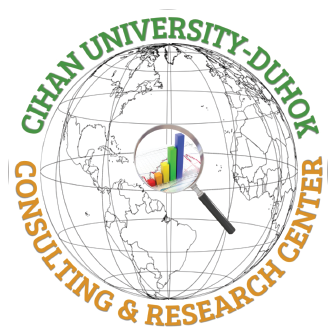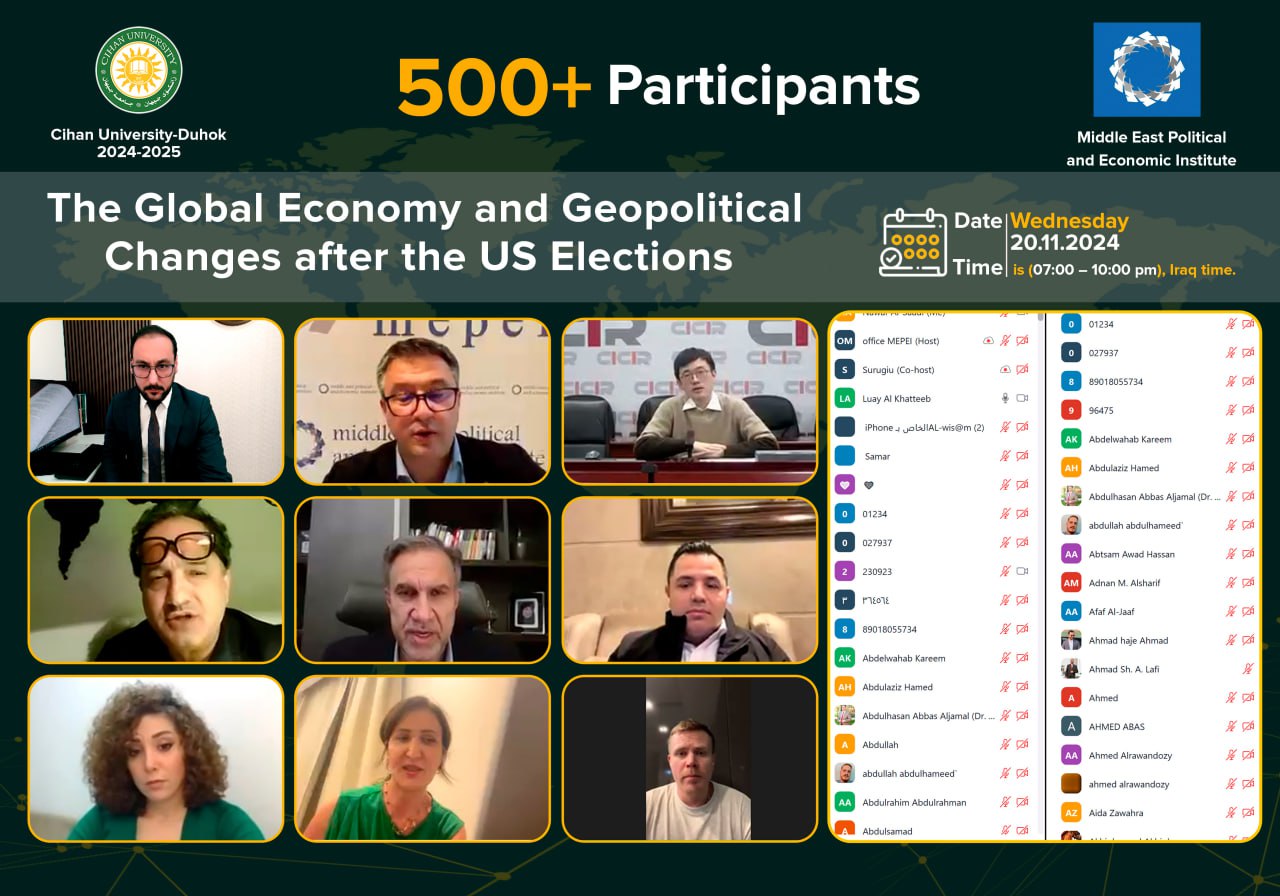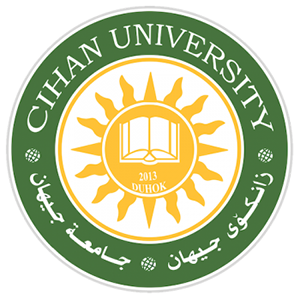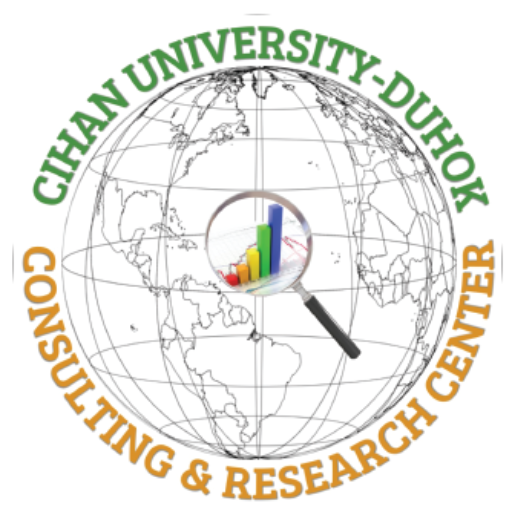On Wednesday, November 20, 2024, the Consulting & Research Centre at Cihan University – Duhok, in collaboration with the Middle East Institute for Political and Economic Studies in Romania, organized an international conference titled “The Global Economy and Geopolitical Changes Post-U.S. Elections.” Held via Zoom, the conference attracted over 500 participants, including distinguished academics, politicians, economists, and media professionals from various countries. The President of Cihan University-Duhok, Prof. Dr. Zeravan Abdulmuhsen Asaad, honored the event with his attendance, underscoring the university’s commitment to fostering academic discourse on critical global issues.
The conference featured two main sessions, which provided a platform for thought-provoking discussions and in-depth analyses.
First Session: Moderated by Dr. Flavius Caba-Maria
Dr. Flavius Caba-Maria, President of the Middle East Political and Economic Institute in Bucharest, Romania, opened the first session by shedding light on the shifts in global dynamics following Donald Trump’s anticipated victory in the 2024 U.S. elections. Dr. Flavius observed that the U.S. is steering towards traditional values and conservative principles, coupled with a transactional approach to foreign policy. While this shift challenges the multilateral frameworks historically championed by the West, it offers countries in the Global South opportunities to reduce their reliance on Western influence.
Regarding the Middle East, Dr. Flavius explained that Trump’s policies are focused on fostering normalization between Saudi Arabia and Israel while pursuing a new agreement with Iran. However, this approach, deeply aligned with Israeli interests, could hinder Palestinian progress and broader peace initiatives in the region.
Dr. Qian Tian, Deputy Director of the Institute of Middle East Studies at the Chinese Institute of Contemporary International Relations in Beijing, addressed the intensifying rivalry between the United States and China. Dr. Tian forecasted that Trump’s presidency would escalate economic tensions through tariffs and sanctions, compounding the challenges China faces as it transitions to a knowledge-based economy.
Dr. Tian highlighted Trump’s strong support for Israel, which complicates his aspirations for peace in the Middle East. The effort to expand the Abraham Accords faces hurdles, particularly due to Saudi Arabia’s neutral stance, which limits the potential for stronger Arab-Israeli relations. Nevertheless, Dr. Tian emphasized that BRICS would continue its trajectory of growth and expand its engagement with non-member countries during Trump’s administration.
Prof. Dr. Kayhan Barzegar, Senior Academic Advisor and Professor at Azad University in Tehran, elaborated on the technological gap in the MENA region, which has been exacerbated by Western sanctions. This divide, he argued, has intensified disparities and obstructed peace efforts across the region. Dr. Barzegar noted that while Western powers leverage technological dominance, Eastern nations are capitalizing on geographical advantages and historical connections to realign supply chains. Institutions like BRICS are bolstering efforts to challenge Western influence, particularly in the Middle East.
Additionally, Dr. Barzegar pointed out that Europe’s increasing reliance on U.S. policies has diminished its role in resolving regional conflicts, leaving the Middle East more exposed to power struggles between the West and the East.
Dr. Alexey Khlebnikov, Middle East Expert at the Russian International Affairs Council in Moscow, emphasized the continuity of Russian policy in the Middle East, irrespective of changes in U.S. administrations. He noted the limited U.S. military presence in Syria, which has maintained the status quo in the region. Dr. Khlebnikov suggested that a U.S. withdrawal could bring stability to Syria and potentially benefit Russian strategic goals.
He further explained Russia’s efforts to strengthen relationships with Gulf monarchies. However, the recent normalization between Saudi Arabia and Iran complicates Moscow’s attempts to establish an anti-Iran coalition, forcing Russia to diversify its diplomatic strategies to address these challenges.
Second Session: Moderated by Assist. Prof. Dr. Nawar Al-Saadi
Dr. Nawar Al-Saadi, Director of the Research Center at Cihan University-Duhok. Dr. Al-Saadi set the stage by emphasizing the importance of understanding the intricate link between economic policies and geopolitical developments in shaping global stability. He highlighted the session’s focus on energy policies, security dynamics, and diplomatic strategies, framing the discussion within the context of Trump’s anticipated foreign and domestic policies. His comprehensive moderation encouraged an engaging and insightful dialogue among the distinguished speakers.
Prof. Dr. Louay Al-Khatteeb, Former Minister of Energy in Iraq, presented a detailed analysis of the potential impact of Trump’s administration on the global energy market. Dr. Al-Khatteeb explained that Trump’s focus on boosting U.S. energy independence through increased fossil fuel production, deregulation, and a diminished commitment to the Paris Agreement could lead to a decline in global oil prices, ranging between $40 and $70 per barrel. Such developments would exert significant pressure on oil-dependent economies, particularly Iraq and Gulf Cooperation Council (GCC) countries.
Domestically, Dr. Al-Khatteeb noted, Trump aims to cut public spending by one-third by 2026, targeting environmental initiatives, renewable energy subsidies, and foreign aid while prioritizing fossil fuel production. He argued that Trump’s foreign policy in the Middle East would rely on economic sanctions rather than military interventions, marking a strategic shift in U.S. engagement in the region.
Assist. Prof. Dr. Muhanad Seloom, Critical Security Studies expert at the Doha Institute for Graduate Studies, explored the economic repercussions of military tensions in the Middle East. Dr. Seloom emphasized that Trump’s primary focus would be resolving the Ukraine-Russia conflict as a precursor to addressing Middle Eastern dynamics.
He explained that Saudi Arabia supports U.S. pressure on Iran but prefers diplomatic solutions to avoid direct conflict, especially concerning Israel. Dr. Seloom highlighted that Trump’s strategy is likely to avoid military escalation in Syria and Iraq, favoring non-military approaches to managing regional tensions.
Mrs. Rafah Alsaad, Senior Reporter and Political Program Presenter on Al-Arabiya, offered insights into Trump’s perspective on the Gaza conflict. She explained that Trump believes his administration’s deal-making capabilities would have prevented the war. Mrs. Alsaad noted that Trump is expected to exert significant pressure on Iran to engage in negotiations with Israel while maintaining robust military support for Israeli interests.
In a recent interview with Al-Arabiya, Trump reaffirmed his belief that his leadership would have avoided the Gaza conflict, illustrating his intent to leverage diplomacy to address regional tensions.
Q&A Session
Following the presentations, the conference transitioned into a Q&A session, providing an opportunity for attendees to interact directly with the panelists. The session featured dynamic exchanges, with participants posing thought-provoking questions and sharing insights that further enriched the discussions. The interactive dialogue extended for over an hour, covering a wide range of geopolitical and economic issues related to the conference themes.
Conclusion
The conference concluded with key takeaways emphasizing the critical need for global and regional collaboration in navigating the complex interplay of politics, economics, and security. Participants highlighted the importance of balanced foreign policies, sustainable economic strategies, and fostering international partnerships to address the challenges posed by the shifting global landscape. The discussions underscored the central role of academia and research institutions in shaping informed policy decisions and promoting constructive dialogue on pressing international issues.












